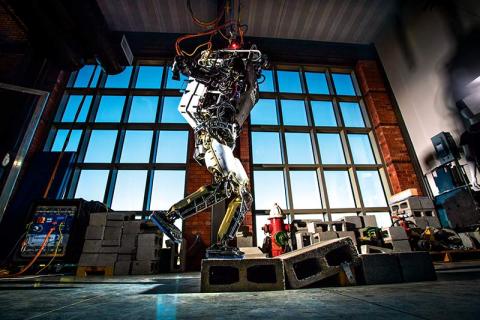Amped up for artificial intelligence
Does the notion of artificial intelligence have you conjuring up Hollywood’s images of cyborgs, posing as humans, coming back from the future to change the fate of the world? Or is the mere concept of AI (as scientists refer to it) emblematic of a world in which sentient computers like HAL, from 2001: A Space Odyssey, override the wishes of the humans they’re designed to assist and, while speaking in a soft eerie monotone, diabolically plan the deaths of an entire spaceship crew?
If the androids of Westworld are the pejorative side of AI, heightened by a moviemaker’s poetic license, the truth, in fact, is that artificial intelligence, analogous to the science fiction of yesteryear, is already responsible for bettering the lives of humans in the real world. Artificial intelligence can be found in the electronics of your car, the Roomba that vacuums your home, or those smartphones we’re all tethered to. And, that doesn’t take into consideration thermostats that know when you’re home and adjust the temperature, sophisticated fraud detection alerts on your bank account, or the music or movie recommendations provided to you by Spotify or Netflix.
“The notion of artificial intelligence has been around for a long time, but only recently have we had sufficiently powerful computers to actualize the ideas in this field,” said Ken Ford, who earned a PhD in computer science from Tulane in 1987. Ford is the founder and CEO of the Florida Institute for Human and Machine Cognition in Pensacola, Florida.
To walk around the institute is to come face-to-face with impressive robotic figures. In fact, Ford’s team from IHMC beat an array of competitors at the international Defense Advanced Research Projects Agency Robotics Challenge in June 2015. It earned first place against American teams, including MIT and Carnegie Mellon, and second place overall, garnering $1 million in prize money.
Ford emphasizes that this institute isn’t about replacing the human, but about amplifying them.
“There are various camps in the AI community,” said Ford. “Some are trying to build machines whose behavior is indistinguishable from humans. That was the original group. IHMC is a reaction to that as we’re not into building artificial humans. They are in good supply, already. And, by the way, the term artificial is a singularly poor name. Perhaps enhanced, augmented or amplified intelligence would be more apropos. Artificial implies something fake.”
To be sure, there’s nothing fake about the sort of intelligence that computers have been imbued with. Witness IBM’s Watson, which beat out the best human contestant to win “Jeopardy,” or the stunning win by the British company DeepMind, whose AI AlphaGo beat the 18-time world champion Lee Sedol at the Chinese board game called Go. It had long been considered an impossible task for computers to play Go at a world-class level.
Like this article? Keep reading: Amped Up
This article originally appeared in the March 2017 issue of Tulane magazine.

